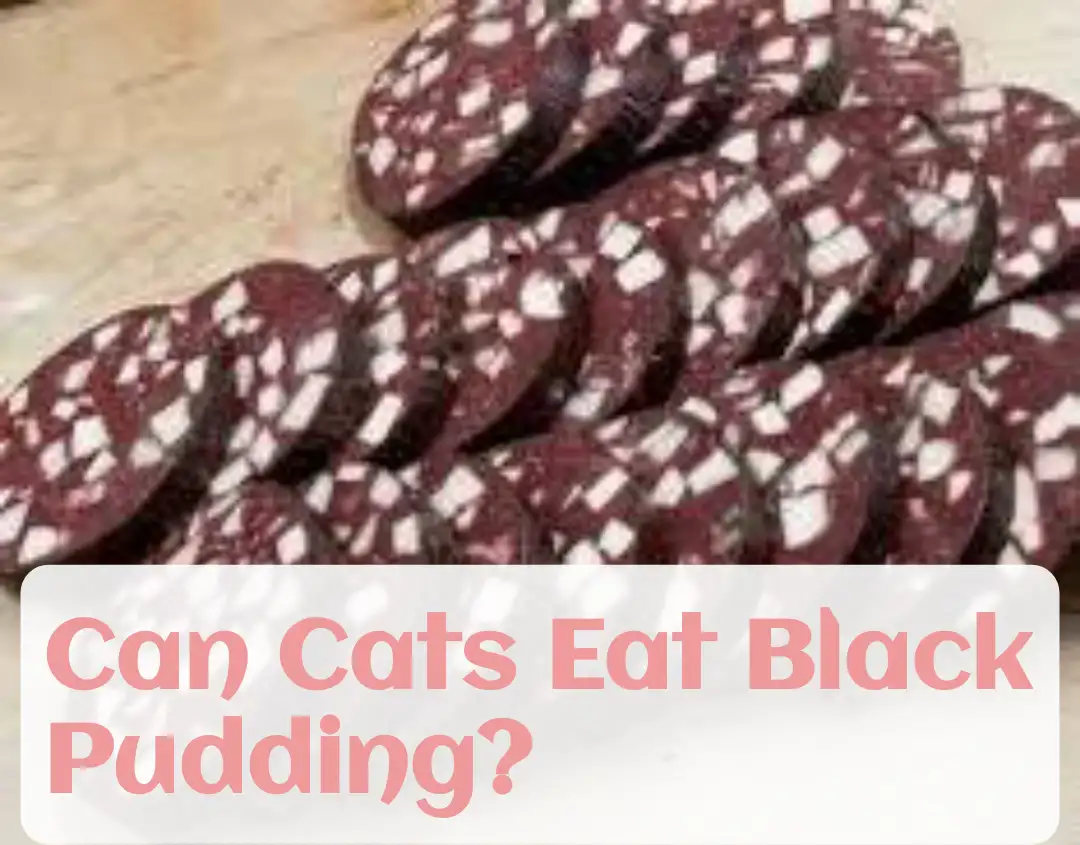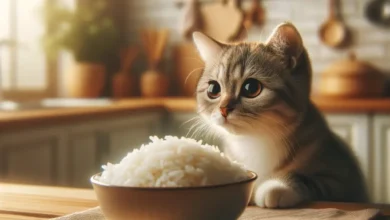Can Cats Eat Black Pudding? 5 Ingredients You Should Know

Can cats eat black pudding? That aromatic sizzle of black pudding in the pan is enough to water your mouth. But before you dish out a morsel of that blood sausage to your curious kitty, paws (and pause)! Black pudding may be a treasured staple in the full English breakfast, but can cats eat black pudding?
In this post, we’ll sauté the facts on black pudding’s ingredients and nutritional value. You’ll also learn how to safely prepare and serve black pudding to cats if you dare to go there. And if the cons outweigh the pros, no need to get your whiskers in a twist—we’ll suggest healthy, cat-friendly alternatives that will earn you purrs instead of claws. Let Us dive in!
Table of Contents
- What Is Black Pudding?
- Can Cats Eat Black Pudding?
- What Are Black Pudding’s Main Ingredients?
- How Should Black Pudding Be Prepared And Served To Cats?
- Alternative Options To Black Pudding That Provide Required Nutrition for Cats
- Is Black Pudding Safe For Cats? – Final Thoughts
What Is Black Pudding?
Black pudding, also known as blood pudding or blood sausage, is a distinctive and divisive sausage that has been a staple in British and Irish cuisine for centuries.
Despite its name, black pudding is not a dessert or pudding; it is a savory sausage made from pig’s blood, herbs, onions, and spices, mixed with oatmeal or barley.
Although the thought of eating blood may not be appealing to everyone, I as a fan of black pudding, appreciate the subtle and slightly sweet taste that emerges from the blend of these ingredients.
The origins of black pudding can be traced back to when every part of the pig was used. It served as a practical way to utilize the blood left over from animal slaughter.
Throughout history, this type of sausage has endured both periods of popularity and decline. In the 1960s, it lost its appeal, but in recent times, it has experienced a revival among British chefs.
Today, black pudding is not limited to breakfast plates as part of an English or Irish breakfast; it has found its way into various dishes like mashed potatoes, bubbles, squeak, and gravies.
Can Cats Eat Black Pudding?
Although cats can technically consume a small portion of black pudding without major harm, it is not recommended as a regular treat for several reasons. Firstly, the ingredients in black pudding may not be optimal for cats.
Feeding cats black pudding can be problematic due to the potential toxicity of certain ingredients it contains. For instance, onions and garlic, which belong to the Allium family of plants, have a compound called N propyl disulfide that can harm a cat’s red blood cells and lead to anemia and other health issues.
Not only that, but black pudding is also high in fat. While cats do need some fat in their diet for energy and nutrition, excessive consumption of fat can result in obesity and other health complications.
Moreover, it’s worth noting that black pudding is a processed food. It’s advisable to provide your cat with fresh and whole foods whenever possible. Processed foods often contain preservatives, additives, and other unhealthy components that may have adverse effects on your cat’s well-being over time.
What Are Black Pudding’s Main Ingredients?
These are the main ingredients used in making black pudding and how they could affect or benefit your cat:
Pigs blood
Black pudding, which is primarily made from pigs’ blood, does not directly affect cats. Cats are obligate carnivores, meaning their diet should mainly consist of animal-based proteins. Although blood contains essential nutrients like iron and protein, cats typically obtain these nutrients from meat sources.
Onions
Onions are harmful to cats as mentioned earlier and can cause gastrointestinal problems such as vomiting, diarrhea, and abdominal pain. In severe cases, consuming onions can even lead to a condition called hemolytic anemia, which poses a significant health risk for cats as it damages red blood cells.
Herbs and spice
The herbs and spices used in black pudding might not be harmful to cats in small quantities. However, it’s important to note that certain herbs and spices like garlic can also be toxic to cats and should be avoided in their diet.
Oatmeal and barley
Oatmeal and barley are grains, but it’s worth mentioning that cats don’t have a natural requirement for grains in their diet since they are obligate carnivores. While a small amount of grains may not cause harm, excessive consumption could potentially lead to digestive issues or food sensitivities in some cats.
How Should Black Pudding Be Prepared And Served To Cats?
If you decide to give your cat black pudding, it’s crucial to take necessary measures to minimize the risk of your cat falling ill due to food-borne diseases. Here are some recommendations to keep in mind while preparing black pudding for your furry companion;
It’s usually better to prepare black pudding in your kitchen instead of purchasing it from a store. This way, you have full control over the ingredients and cooking techniques, guaranteeing the safety and healthiness of the black pudding for your feline friend. However, if you decide to buy black pudding from a store, be sure to opt for a well-known brand and carefully adhere to the provided cooking and storage instructions.
Make sure to cook the black pudding thoroughly until it is piping hot and the sausage is fully cooked. This will help eliminate any potential bacteria, like Salmonella or E.coli, that might be present.
To prevent weight gain or potential health issues, serving black pudding in moderate quantities is advisable due to its high fat and calorie content. Begin with a small portion, like 1/4 teaspoon per pound of body weight.
Alternative Options To Black Pudding That Provide Required Nutrition for Cats
Personally, here are alternatives I enjoy feeding to my cats and they can be used as both treats or in addition to the meal the cat, depending on your nutritional calculations:
Organ Meat
Incorporate organ meats into your diet, such as liver or kidney. These types of organ meats offer essential vitamins, minerals, and protein. Whenever available, opt for organic choices. Cook them thoroughly and slice them into small, manageable pieces before serving.
Eggs
Cats can benefit from consuming scrambled, hard-boiled or raw egg yolks as they are rich in protein and fatty acids. Additionally, cooked egg whites can also be included in their diet.
Fish
Oily fish like sardines or salmon. Canned fish packed in water provides protein, omega-3, and other nutrients. Look for fish packed without added salt.
Bone Broth
Broth made from bones or meat, whether homemade or bought without added sodium, not only adds moisture but also provides a range of vitamins and minerals.
Chicken and Lamb treats
You can enjoy small chicken, turkey, beef, or lamb portions. Lean and unseasoned cooked meat can be quite delicious as a treat.
Probiotics
Small amounts of plain, unsweetened yogurt or probiotic supplements support digestion.
The key is to feed a balance of protein, fatty acids, vitamins, and minerals. Work these alternatives into a healthy, portion-controlled diet for optimal feline nutrition. Check with your veterinarian if you have any concerns
Is Black Pudding Safe For Cats? – Final Thoughts
To sum up, while black pudding can be a tasty and nourishing indulgence for us humans, it might not be the best choice for our furry feline companions. The potential risks associated with certain ingredients, along with their high-fat content and processed nature, make black pudding less than ideal for cats.
If you’re keen on diversifying your cat’s diet, there are numerous other safe and nutritious options to consider. Organ meats, eggs, fish, bone broth, and probiotics are all healthy alternatives that can be incorporated into their meals in moderate amounts or used as occasional treats.



